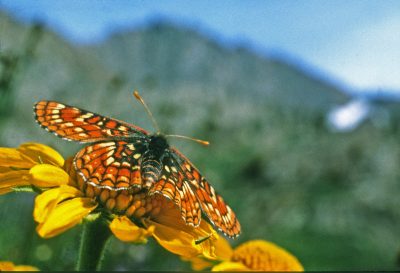Rapid Evolution Fails to Save Butterflies
December 3, 2018

New research from the University of Plymouth and The University of Texas at Austin has found that adaption has its limits. The study examined a population of butterflies that adapted to a weed that was introduced with cattle ranching, but quickly died out when ranching ceased and the environment around the weed changed.
The research shows that while wild species can adapt quickly to human-induced changes, the adaption can cause species to be caught in deadly “eco evolutionary traps” when resources are quickly taken away.
The findings were the cover story of the May 10, 2018, edition of Nature.
The researchers followed a large, isolated population of Euphydryas butterflies on a Nevada ranch that had historically fed on a native plant. The researchers documented how the population evolved complete dependence on a European weed introduced to Nevada with cattle ranching more than 100 years ago, and quickly died off when cattle ranching ended in 2005 — a change that led to temperature changes around the weed that prevented butterfly caterpillars from developing.
European conservation biologists have long believed this type of process is underlying widespread butterfly population extinctions across Europe. However, in Europe the evolution of dependence on human management occurred before anyone documented it. The researchers said that this study is the first that provides hard evidence of the process in real time.
Co-author Camille Parmesan, a professor at the University of Plymouth and the Jackson School of Geosciences, said the findings point to the need to mesh land management practices with conservation
Back to the Newsletter